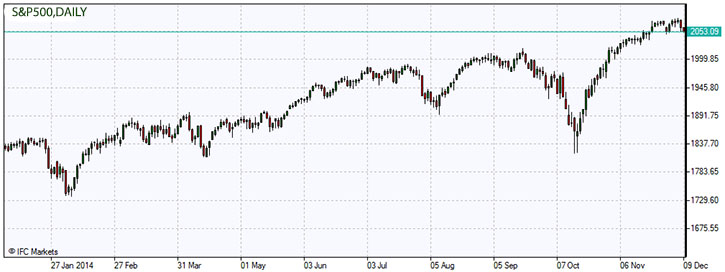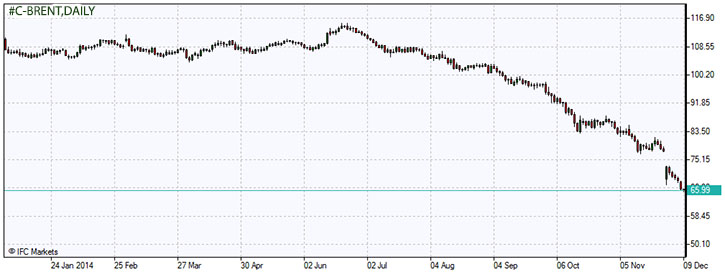By IFCMarkets
US stock markets slumped on Monday recording their biggest one-day slide in nearly seven weeks as continuing oil decline prompted investors to sell-off energy stocks. Disappointing economic reports released on Monday, including lower Chinese trade numbers, contracting Japanese economy in the third quarter and lower expansion of Germany industrial production in October also contributed to worsening investor sentiment. Oil giants ExxonMobil Corp. and Chevron Corp dropped 2.3% and 3.7% respectively, Apple Inc. fell 2.3%. S&P 500 and The Dow Jones Industrial Average slipped 0.75% and 0.6% respectively. The ICE U.S. Dollar Index, a measure of the dollar’s strength against a basket of six rival currencies, was down 0.26%, its first loss in two sessions.

European stocks fell Monday after reports indicating that imports into China unexpectedly fell in November by 6.7% against expectations for 3% growth, and industrial production in Germany rose less than expected. European Central Bank Governor Ewald Nowotny expressed concerns about weakening growth in the eurozone economy at a conference in Frankfurt Monday. He warned that eurozone inflation could continue to fall during the first quarter of 2015, which would take the currency union dangerously close to deflation, and said he would like to see the ECB expand its balance sheet by €1 trillion. On the prospects of further easing of monetary policy by ECB euro fell to $1.2265, a 28-month low, from $1.2289 late Friday. In a separate report the Paris-based research body – the Organization for Economic Cooperation and Development said a composite leading indicator continues to indicate a loss of growth momentum in eurozone, particularly in Germany and Italy.
The Nikkei share average fell 0.5 percent on Tuesday after 7 straight days of gains as a rebound in yen prompted investors to take profits. The yen rose to around 120.90 to the dollar from a low of 121.86 on Monday. Investors are still optimistic as they expect Prime Minister Shinzo Abe to win a weekend re-election bid that will allow him to continue with the government’s pro-growth policies.
Crude-oil prices again tumbled to five-year lows Monday with WTI futures for January delivery dropping 4.2%, to settle at $63.05 a barrel. Analysts expect the oversupply to continue into next year without intervention by the Organization of the Petroleum Exporting Countries to cut output to balance the market. A Baker Hughes report on Friday showed an increase in the US drilling rig count, despite the falling price. A separate report from KBC Energy Economics showed less than a third of January’s cargos of Nigerian oil have been sold with just two weeks left before February deliveries. The surplus of West African crude is one indicator of Atlantic basin oil demand, and unsold inventories pressure Brent crude prices.

Nickel fell for a third day as disappointing data from Germany to China indicated weakening global demand. And on the LME, lead, aluminum and zinc were little changed, while tin fell.
Free Reports:
 Get Our Free Metatrader 4 Indicators - Put Our Free MetaTrader 4 Custom Indicators on your charts when you join our Weekly Newsletter
Get Our Free Metatrader 4 Indicators - Put Our Free MetaTrader 4 Custom Indicators on your charts when you join our Weekly Newsletter
 Get our Weekly Commitment of Traders Reports - See where the biggest traders (Hedge Funds and Commercial Hedgers) are positioned in the futures markets on a weekly basis.
Get our Weekly Commitment of Traders Reports - See where the biggest traders (Hedge Funds and Commercial Hedgers) are positioned in the futures markets on a weekly basis.
The Australian Bureau of Agricultural and Resource Economics and Sciences said in a report that exports to the US from the third-largest shipper will jump 35 percent to 360,000 metric tons in 2014-2015. Years of drought forced the US producers to cull herds, and cattle futures reached a record last month. Prices may rise the most among agricultural commodities next year amid tight supply and strong demand, according to Rabobank International.
Market Analysis provided by IFCMarkets